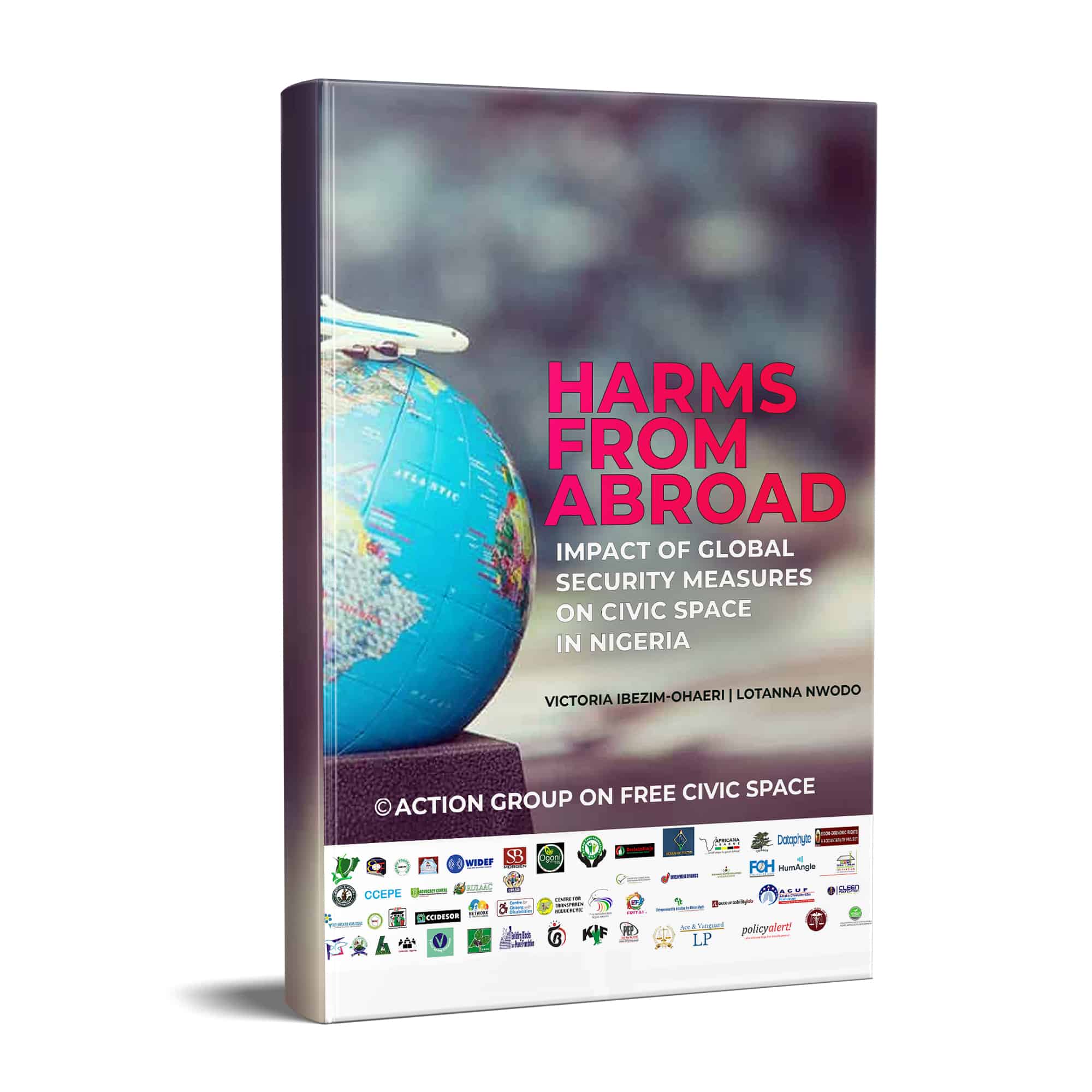This article was published more than 3 years ago.
This week, Nigeria will join more than 100 other participating nations at the U.S.-organized Summit for Democracy. But new research shows that Nigeria’s government has used chilling authoritarian tactics to stifle protest and consolidate control—at the cost of the country’s democratic values.
In two new comprehensive and deeply researched reports, the Action Group on Free Civic Space—a collective of Nigerian civil society organizations—offers irrefutable evidence of Nigeria’s turn to authoritarianism. The Security Playbook of Digital Authoritarianism, released today, outlines how the government has misused technology to surveil, harass, and repress independent voices. Harms From Abroad: Impact of Global Security Measures on Civic Space in Nigeria, also released today, explores how Nigeria has exploited counterterrorism laws to limit civic freedoms. A third report, coming early next year, will document the harms experienced by social justice activists and communities under the guise of countering terrorism and protecting national security.
Read and download both reports HERE.
Some of the tactics revealed in these reports have been front-page news in recent years. From the violent repression of the #EndSARS movement to the harsh enforcement of the country’s COVID-19 curfew, the Nigerian government has a clear track record of abusing its security infrastructure. But the Action Group on Free Civic Space has exposed the sheer scale of Nigeria’s digital authoritarianism: massive financial investment, pervasive surveillance technologies, and the cooperation of the private sector.
The research also reveals how the state’s security playbook has been enabled by global counterrorism frameworks and poorly regular multinational technology firms, and exploited by Nigeria’s security agencies. The sprawling anti–money laundering and antiterrorism architectures, assembled by bodies like the UN and the Financial Action Task Force, has required and inspired the Nigerian state to pass a raft of domestic laws and measures used to undermine constitutionally guaranteed rights and freedoms. And specific Israeli, U.S., and Chinese companies—named in these reports—have steadily supplied the Nigerian government with surveillance and other information and communication technologies used to repress human rights.
“These reports are a substantial advance on anything in the existing literature,” says Dr. Tony Roberts, a research fellow at the Institute of Development Studies and co-founder of the African Digital Rights Network. “They make a really important contribution to existing knowledge on this subject.”
A Better Way Forward
Critically, the authors also offer a clear roadmap for better digital and security practices that respect human rights and civic space:
- To prevent the Nigerian government from exploiting ambiguous security measures for political purposes, the authors call for broad or vague wording in legislation to be replaced with precise, specific language, and the development of a transparent framework and process for the designation and delisting of groups as terrorists.
- To hold civil and security agencies to their obligations to respect civic freedoms and privacy online, the authors call for robust and consistent enforcement of the Nigerian Data Protection Regulation (which incorporates African Union and European Union standards).
- To stop companies profiteering from Nigeria’s creeping authoritarianism, the authors call for stronger import controls, a ban on surveillance and hacking technologies, and compliance with the UN Guiding Principles on Business and Human Rights.
“The papers are very comprehensive and cover a lot of ground in terms of the various forms of digital repression present in Nigeria, from the censorship of the internet (via both government takedown pressure and technical blocking), the use of spyware against protesters and the opposition, the biometric databases run by the state, rise of internet shutdowns, and lack of data privacy protections,” says Steve Feldstein, senior fellow at the Carnegie Endowment for International Peace and founder of the Digital Democracy Network.
“The reports also discuss the role that international security organizations, like the Financial Action Task Force, play in normalizing surveillance for counterterrorism purposes, which is a useful case study of well-intentioned international norms and laws having unintended consequences.”
The Global Security Playbook
Nigeria’s shocking tactics recall similarly autocratic tendencies around the world. But while big picture patterns and trends are illuminating, understanding the context-specific details of democratic backsliding under the guise of security is fundamental to reversing authoritarian gains. That’s why the Fund is supporting grassroots research across the globe—including in Nigeria, the Philippines, Kenya, and Mexico—so that activists can better diagnose the problems, identify entry points, and craft strategies to tackle and transform the security playbook.
The value of this research goes much further than adding to sectoral knowledge, explains Victoria Ibezim-Ohaeri, executive director of Fund grantee Spaces for Change and co-author of the reports. It’s also a fundamental step toward dismantling the surveillance ecosystem.
“Opportunities to disrupt, to reform and—over the long term—to transform the misuse of technology hinge on a holistic approach that balances the competing agendas of different stakeholders, including the government, the private sector, civil society, and the media,” Ibezim-Ohaeri says. “We must not only fill the gaps in data access policies, practices, and procedures, but also shore up the structural vulnerabilities that government exploit to misuse technology.”
Learn more about the Fund’s work building civic power.

